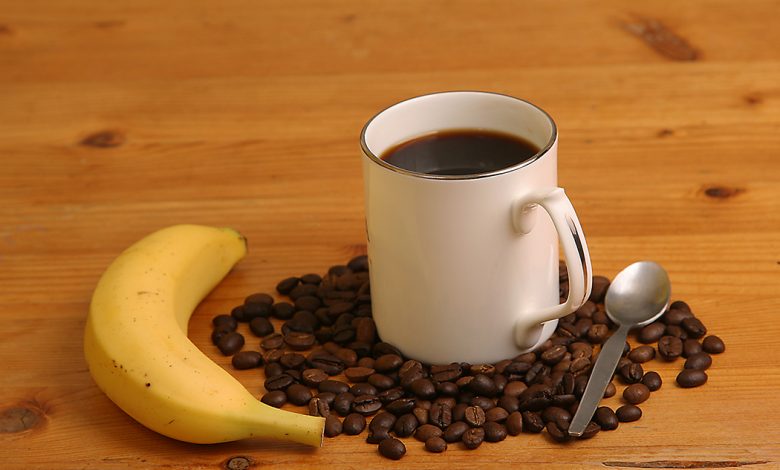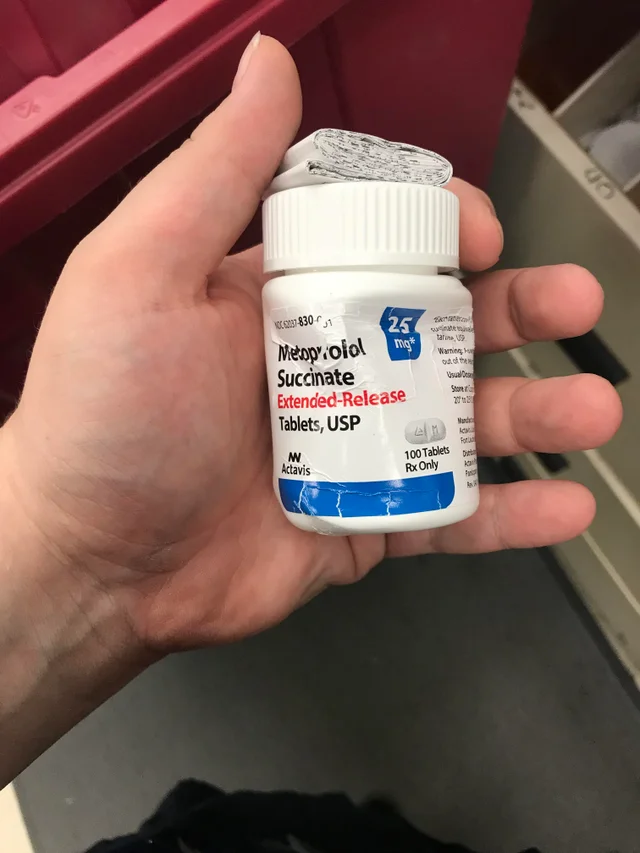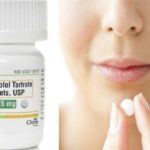What Foods Should I Avoid While Taking Metoprolol?

For most people, taking a new medication may mean switching up your lifestyle a bit and that includes the foods you eat. A food-drug interaction means that a specific nutrient or compound within the food changes the way your body metabolizes the medication, and this can either enhance or reduce the dose your body gets, according to Johns Hopkins Medicine. The potential results: an increased risk of side effects, many of which can be dangerous, or the drug not working as it was intended.
Before introducing a medication, ask your pharmacist about any food interactions, including with alcohol, and any adjustments you may have to make to your diet. In this article, we will discuss metoprolol and the foods to avoid while taking it.

What is metoprolol oral tablet?
Metoprolol is a medication used alone or together with other medicines to treat high blood pressure (hypertension). High blood pressure adds to the workload of the heart and arteries. If it continues for a long time, the heart and arteries may not function properly. This can damage the blood vessels of the brain, heart, and kidneys, resulting in a stroke, heart failure, or kidney failure. High blood pressure may also increase the risk of heart attacks or strokes. These problems may be less likely to occur if blood pressure is controlled.
Metoprolol is also used to treat severe chest pain (angina) and lowers the risk of repeated heart attacks. It is given to people who have already had a heart attack. In addition, metoprolol is used to treat patients with heart failure.
This medicine is a beta-blocker. It works by affecting the response to nerve impulses in certain parts of the body, like the heart. As a result, the heart beats slower and decreases blood pressure. When the blood pressure is lowered, the amount of blood and oxygen is increased in the heart.
Metoprolol is available in these two forms, which are described in more detail below:
- immediate-release tablets, called metoprolol tartrate
- extended-release tablets, called metoprolol succinate
Both of these forms of metoprolol can be used to:
- prevent angina (a type of chest pain)
- treat high blood pressure
Additionally, metoprolol succinate is used to treat heart failure. And metoprolol tartrate is used to treat a heart attack or prevent one from occurring in the future.
Both metoprolol succinate and metoprolol tartrate can be used in adults. In addition, metoprolol succinate can be used in some children with high blood pressure.
Metoprolol tartrate is an immediate-release tablet, which means it works right away after you take it. Metoprolol succinate, on the other hand, is an extended-release tablet. It works consistently over a period of time after you take it.
How should I take metoprolol?
As stated above, metoprolol comes as a tablet and an extended-release (long-acting) tablet to take by mouth. The regular tablet is usually taken once or twice a day with meals or immediately after meals. The extended-release tablet is usually taken once a day. To help you remember to take metoprolol, take it around the same time(s) every day. Follow the directions on your prescription label carefully, and ask your doctor or pharmacist to explain any part you do not understand. Take metoprolol exactly as directed. Do not take more or less of it or take it more often than prescribed by your doctor.
The extended-release tablet may be split. Swallow the whole or half tablets whole; do not chew or crush them.
Your doctor may start you on a low dose of metoprolol and gradually increase your dose.
Metoprolol controls high blood pressure and angina but does not cure them. Metoprolol extended-release tablets control heart failure but do not cure it. It may take a few weeks before you feel the full benefit of metoprolol. Continue to take metoprolol even if you feel well.
What foods should I avoid while taking metoprolol?
There are several foods that should be avoided while taking metoprolol because they can affect the way the medication works. These foods include:
- High sugar foods: Although metoprolol effectively treats high blood pressure but may raise blood sugars as well. Avoid sugary food while taking metoprolol because having too much sugar in the blood for long periods of time can cause serious health problems if it’s not treated. Hyperglycemia can damage the vessels that supply blood to vital organs, which can increase the risk of heart disease and stroke, kidney disease, vision problems, and nerve problems.
- Potassium Rich Foods: Metoprolol is a beta-blocker that increases the potassium level in the blood. Potassium levels in cells are very high, and they are kept that way actively by ion pumps in the cell membranes, which push sodium out and potassium in. These pumps are partially blocked by beta-blockers like metoprolol, so that is one reason your potassium level increases. Taking potassium-rich foods like meat, milk, bananas, and sweet potatoes while taking metoprolol can result in high blood potassium levels. Dangerously high potassium levels affect the heart and cause a sudden onset of life-threatening problems. Hyperkalemia symptoms include Abdominal (belly) pain and diarrhea.
- St. John Wort tea: Avoid taking St. John’s wort while taking metoprolol, It is known to interact with a number of drugs, including beta-blockers, as it induces the hepatic cytochrome P450 system and causes faster drug metabolism.
- Coffee and energy drinks: Avoid taking coffee and energy drinks containing caffeine because it can decrease the effectiveness of metoprolol. It is, therefore, better to avoid the intake of caffeine-containing foods and beverages while taking metoprolol. This includes sodas containing caffeine. According to reports, when tested under laboratory conditions, Pepsi one was found to contain a hefty 57.1mg of caffeine. That compared to just 10.3mg in the least caffeinated branded cola, Ritz Cola, and only 4.9 mg in private brand IGA Cola.
- Alcohol: Alcohol is another beverage you should avoid while taking metoprolol. Drinking alcohol while you’re taking a beta-blocker can cause your blood pressure to fall. A significant drop can cause you to faint and possibly injure yourself. In addition, alcohol alone can have negative effects on the condition you’re taking a beta-blocker for. Drinking alcohol while taking metoprolol could increase side effects such as drowsiness and dizziness.





